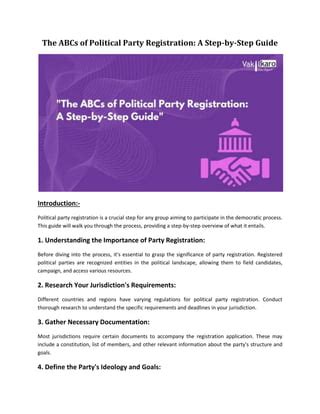Introduction
Political parties play an indispensable role in the fabric of a democratic society. They serve as vehicles through which ideas are articulated, policies are formulated, and governance is shaped. Understanding the key principles and ideologies that underpin political parties is crucial for navigating the complex landscape of modern politics.

Understanding Core Principles
At their core, political parties are organized around a set of shared principles and values. These principles guide their approach to governance and inform their policy positions. Common core principles include:
- Ideology: Parties adhere to a specific political ideology, such as conservatism, liberalism, or socialism, which shapes their stance on key issues.
- Values: Parties espouse particular values, such as equality, freedom, or social justice, that influence their policy priorities.
- Goals: Parties pursue specific goals, such as economic growth, environmental sustainability, or national security, which guide their actions.
Classifying Political Ideologies
Political ideologies are typically categorized along a spectrum from left to right.
- Left-Wing Ideologies: Left-wing parties emphasize social equality, government intervention in the economy, and collective action. Key ideologies include socialism, communism, and social democracy.
- Right-Wing Ideologies: Right-wing parties generally favor individual liberty, limited government intervention, and free market principles. Key ideologies include conservatism, libertarianism, and nationalism.
Left-Wing and Right-Wing Positions on Key Issues
| Issue | Left-Wing Position | Right-Wing Position |
|---|---|---|
| Healthcare | Universal healthcare provided by the government | Private healthcare with minimal government involvement |
| Education | Free or low-cost education for all | School choice and vouchers for private education |
| Taxes | Progressive taxation to redistribute wealth | Flat or low taxes to stimulate economic growth |
| Social Welfare | Robust social welfare programs to support the needy | Limited social welfare programs focused on the truly vulnerable |
| Environmental Regulation | Government intervention to protect the environment | deregulation to encourage economic development |
The Role of Political Parties in a Democracy
Political parties play several key roles in a democratic society:
- Articulating Ideas: Parties present their ideologies and policy proposals to the public, shaping the political discourse.
- Mobilizing Voters: Parties organize and mobilize voters to support their candidates and policies.
- Forming Governments: Parties that gain sufficient electoral support can form governments and enact their policies.
- Providing Accountability: Parties are held accountable for their actions by the electorate and by opposition parties.
- Representing Interests: Parties represent the interests of specific groups or constituencies, such as labor unions, minorities, or businesses.
Effective Strategies for Political Parties
Effective political parties employ various strategies to succeed:
- Building Strong Relationships: Parties cultivate strong relationships with key stakeholders, including voters, donors, and activists.
- Developing a Clear Message: Parties craft a compelling and easily understandable message that resonates with voters.
- Organizing Grassroots Support: Parties mobilize their supporters to engage in grassroots activities, such as volunteering and canvassing.
- Leveraging Technology: Parties utilize technology to reach a wider audience, build support, and mobilize voters.
- Adapting to Changing Landscapes: Parties adapt their strategies to changing political and societal conditions to remain relevant.
Pros and Cons of Political Parties
| Pros | Cons |
|---|---|
| Provide a platform for political ideas | Can lead to polarization and gridlock |
| Mobilize voters and shape public opinion | Can be influenced by special interests |
| Form stable governments | Can suppress dissent and minority voices |
| Provide accountability | Can become corrupt or unresponsive |
| Promote political participation | Can foster a sense of elitism |
Frequently Asked Questions (FAQs)
-
What is the difference between a political party and a political ideology?
– A political ideology is a set of core beliefs, while a political party is an organized group that seeks to implement those beliefs through political action. -
How do political parties fund their activities?
– Parties raise funds through various sources, including individual donations, corporate contributions, and government subsidies. -
Why do some countries have multiple political parties while others have only a few?
– The number of political parties in a country depends on factors such as the electoral system, political culture, and historical context. -
What are the advantages and disadvantages of a two-party system?
– Advantages include stability and clear choices for voters; disadvantages include limited representation and potential for gridlock. -
How do political parties influence policymaking?
– Parties influence policymaking by controlling the legislative agenda, shaping public opinion, and exerting pressure on elected officials. -
What are the ethical challenges facing political parties?
– Parties face ethical challenges such as corruption, cronyism, and suppression of dissent. -
How can political parties improve their transparency and accountability?
– Parties can improve transparency by disclosing campaign finance information, adopting ethical guidelines, and holding themselves accountable to voters. -
What is the role of political parties in a changing global context?
– Parties play a crucial role in navigating globalization, addressing transnational issues, and adapting to new political landscapes.
Conclusion
Political parties are complex and multifaceted organizations that play a vital role in shaping the political landscape. Understanding their core principles, ideologies, and strategies is essential for navigating the complex world of modern politics. As societies evolve, political parties must adapt to new challenges and opportunities to continue fulfilling their democratic functions effectively.
